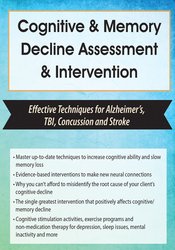

Often overlooked, many co-morbidities and reversible factors can complicate accurate identification of the root cause of your client’s cognitive/memory decline – leading you down a frustrating treatment path that fails to get results.
This dynamic and interactive training recording will leave you confident in your ability to intervene with cognitive/memory decline related to early stage Alzheimer’s, Traumatic Brain Injury (TBI), concussion, Cerebral Vascular Accidents (CVA’s) and Mild Cognitive Impairment (MCI).
You will learn the latest evidence-based assessment and treatment interventions for cognitive/memory impairment as well as master the insight necessary to select the most appropriate interventions and safe discharge environments. We will also discuss the impact of ethnicity, education level, obesity, diabetes and other contributing factors that must be considered in the intervention of cognitive/memory decline.
Watch and you will learn:
The negative implications of misaligned client assessment and treatment interventions are far too important for you to be uncertain and unprepared.
| File type | File name | Number of pages | |
|---|---|---|---|
| Manual - Cognitive & Memory Decline Assessment & Intervention (4.49 MB) | 71 Pages | Available after Purchase |
Maxwell Perkins, MS, OT/L, is an occupational therapist with extensive experience with interdisciplinary clinical management focusing on the geriatric population. His clinical focus is on effective assessment and intervention for older adults experiencing memory/cognition issues in a variety of clinical settings including, acute inpatient/outpatient and skilled nursing facilities. Maxwell is an independent consultant/educator and previously served as the rehab education director for two large health care organizations. He presents continuing education workshops nationally and locally and is an adjunct professor in the Pacific University Occupational Therapy program in Forrest Grove, Oregon. He also is a member of the State of Oregon Occupational Therapy Licensure Board.
Speaker Disclosures:
Financial: Maxwell Perkins has an employment relationship with Pacific University. He receives a speaking honorarium, recording royalties, and a consultant fee from PESI, Inc. He has no relevant financial relationships with ineligible organizations.
Non-financial: Maxwell Perkins has no relevant non-financial relationships.
Cognitive & Memory Intervention For Alzheimer’s * TBI * Concussion * Stroke
Co-Morbidities/Reversible Factors Affecting Cognitive/Memory Function and How to Intervene
Please wait ...